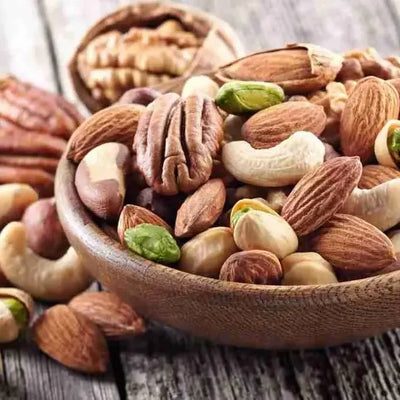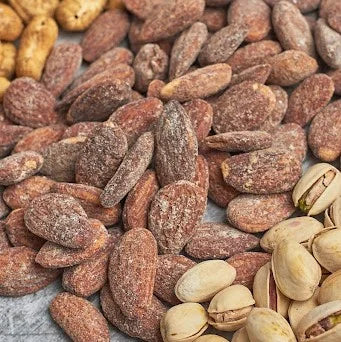When we think about a balanced diet, fats often raise concerns. However, not all fats are created equal: some are essential for optimal body function. This is the case with the healthy fatty acids found in nuts. In this article, we explain what types of fatty acids nuts contain, how they benefit your body, and which varieties are most recommended.
What fatty acids do we find in nuts?
Nuts are rich in unsaturated fats, that is, fatty acids that provide real health benefits. Although their fat content may seem high, these are healthy fats that the body needs.
Monounsaturated fatty acids (omega-9)
Found in fruits such as almonds, hazelnuts, and cashews, these fatty acids help reduce LDL (bad) cholesterol and increase HDL (good) cholesterol. They also promote cardiovascular health and help maintain stable blood glucose levels.
Polyunsaturated fatty acids (omega-3 and omega-6)
Omega-3s, such as alpha-linolenic acid (ALA), have anti-inflammatory properties and protect the nervous and cardiovascular systems. Omega-6s, such as linoleic acid, are also essential for the body, although they should be consumed in balance with omega-3s.
Oleic acid
Present in large quantities in various nuts, this fatty acid is known for its benefits for heart health and for its protective effect on the skin and cell membranes.
Are the fatty acids in roasted nuts retained?
Yes, the unsaturated fatty acids present in nuts are largely preserved after roasting, especially if it is dry roasted at moderate temperatures. However, polyunsaturated fatty acids, such as omega-3, are more sensitive to heat and can be partially degraded if roasted too intensely. Therefore, it is always preferable to choose raw or lightly roasted nuts without added oils. Furthermore, to prevent the oxidation of healthy fats, they should be stored in cool, dark places and in airtight containers. This preserves both their flavor and nutritional benefits.
Benefits of fatty acids for the body
Incorporating healthy fatty acids through nuts has a positive impact on multiple body systems. It's not just about energy, but also about long-term health.
Cardiovascular health
Fatty acids help regulate blood pressure, reduce triglycerides, and improve arterial elasticity. This translates into a lower risk of cardiovascular disease and better blood circulation.
Brain function and emotional balance
The brain needs fats to function properly. Essential fatty acids promote memory and concentration, and can contribute to emotional balance, reducing the risk of anxiety or depression.
Immune and hormonal system
Fatty acids are involved in hormone synthesis and the regulation of immune responses. A good fat intake promotes hormonal balance and the body's defense against infections or external aggressions.
Skin health
Nourished and healthy skin depends, in part, on good nutrition. Fatty acids help maintain hydration, reduce skin inflammation, and protect the skin from premature aging.
Which nuts are richest in healthy fatty acids?
Choosing the right nuts can make a difference in the quality of the fats we incorporate into our daily diet. Here are the highlights.
Walnuts
Walnuts are especially rich in alpha-linolenic acid (omega-3), making them an ideal food for protecting the heart and reducing inflammation. They also help improve brain function and maintain healthy skin.
Almonds
Almonds contain oleic acid (omega-9) and vitamin E, an excellent combination for protecting cells from oxidative damage, maintaining glowing skin, and promoting cardiovascular health.
Hazelnuts
Hazelnuts primarily provide oleic acid and small amounts of omega-6. They are a balanced option that helps control cholesterol and improve skin elasticity.
Pistachios and cashews
Pistachios and cashews are rich in monounsaturated fats and also contain important minerals such as magnesium and zinc, which contribute to the proper functioning of the immune and nervous systems.
Practical tips for incorporating nuts
You don't have to consume large amounts to notice benefits. A few portions spread out throughout the week can make a difference.
Ideal portions
Between 20 and 30 grams a day is a good amount to take advantage of their nutrients without exceeding the calories. You can eat them as a snack or incorporate them into recipes such as salads, smoothies, or vegetable soups.
Choose natural versions
Opt for raw or roasted nuts without salt. Fried or sugar-added versions reduce their nutritional value and can offset their benefits.
Consistency and variety
Each nut offers a unique combination of nutrients. Alternating between different types will allow you to reap all their benefits and enrich your diet in a balanced way.
Conclusion
The fatty acids found in nuts are much more than a source of energy: they are essential for healthy body function. From the heart and brain to the skin and immune system, these nutrients act on multiple levels to improve your well-being. Including walnuts, almonds, hazelnuts, pistachios, and cashews in your daily diet is a simple yet powerful way to take care of your health from within.






Leave a comment
This site is protected by hCaptcha and the hCaptcha Privacy Policy and Terms of Service apply.